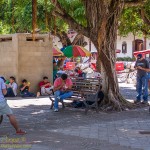A culture is defined by many things.. A language, a religion, a way of life, a racial identity, these and more tie together in an identity that define us. As these ideas are shared by a worldwide communications network, as so many emigrate from homelands wracked by war or economic strife these cultural identities are increasingly mixed and exchanged. Increasingly our modern world is converging on a single common culture.
While this process has been slowly occurring since the Age of Exploration and the dawn of worldwide trade, it has more recently been pushed into hyper-drive by the communications revolution created by the internet. In a historical instant almost anyone, living anywhere has access to and can interact with people across the globe. For recent generations this is now taken for granted and not just available, but a regular occurrence that is an integral part of everyday life.

The first culture to enter this new sphere was Anglo-American, home to the developing communications technologies that began the worldwide net. Being first on the scene allowed American culture to set the ground rules, to perform the first experiments in how these new communications possibilities could be used.
American culture is still dominant, but is increasing rivaled by the other major cultures. European, Latin American, and several Asian cultures have created their own spheres within the network. While somewhat isolated by language, or deliberate governmental restrictions, there is a great deal of interaction. Good, or often bad ideas that originate in one sphere spread to the entire network with increasing rapidity.

As with any trend it is the young who most typify this process, it is younger generations who will often first adopt new ideas. Given access to the cultural concepts and fads of the dominant culture they will quickly assimilate these ideas and concepts. While there is a value in new ideas there is also a price… Traditional values and local languages quickly get pushed aside in the favor of ideas that offer a wider vista in life. In the adoption of the new the traditional is at risk of being lost.
The necessities of survival often accelerate the process. The need to know a worldwide or major regional language and associated customs offers the promise of better jobs and economic possibilities. Emigrating to a city in search of work will make the transition complete, old languages and ways of life abandoned completely. The smaller or more regional a language the more vulnerable it is to this process of erosion.

Thanks to the efforts of ethnographers, linguists, and local practitioners the knowledge is often preserved and recorded. But if it is not spoken and used daily does a language really exist? Much of the useful knowledge is preserved, but it has lost its identity when blended with the enormous body of knowledge common to our species, no longer associated with the culture who discovered and preserved the hard won lessons of survival.
So many cultures are already gone, so many others will join them in another generation. Many traditional cultures struggle against the pressure, attempting to teach the language to the next generation, to provide a place where the culture can thrive. I fear this is a losing battle, that the pressures and lure of the global culture will eventually overwhelm the last bastions of the traditional.
The question is where do we create room for traditional cultures within the global dominant culture? History has shown that many of the unique features of smaller traditional cultures, in particular languages, are so easily lost in the face of cultural assimilation. Can a space be created that will allow a culture to continue?
For many the answer to preserving the traditional is in the building of walls. Independence movements, the formation of reservations or cultural preserves, the seizing local sovereignty offers a way to stem the flood of invading culture, to preserve what one can. These sort of walls can be built, but the price is often economic stagnation. There is no impetus to make investments in a place where language, laws, or customs offer a barrier. The result is all too often lack of opportunity within those walls, and the economic flight of younger residents.
Another tactic is to vilify the global culture and idolize the past of one’s own culture. To somehow convince the next generation to endure the difficulties of economic or racial isolation through a sense of nationalistic pride. This tactic works through basic human motivations, the desire to belong to the tribe, to be a part of the group. The learning of the language, of properly living the culture becomes a touchstone of status within the group. This tactic was quite effective in the past but is increasingly less so thanks to modern communications. The control of information necessary to convince fellow group members is directly challenged by access to information from around the globe.

Can any of these tactics actually succeed? It is possible to preserve the smaller regional cultures? Is it even something that can work in the longer term? Can a space be created with the dominant culture that can preserve languages and customs unique to a small geographic region, a tribe, or even a few villages? Can this be done without denying individuals within that culture economic opportunity and freedom of expression?
Pessimistically I see no practical answer that would accomplish this. What is good for the individual is often in conflict with the culture. We can build the walls, but they are ultimately doomed to failure in the face of our modern world and modern technologies that make it so easy to see past those walls.
Still, despite the pessimism it seems desirable to find a place for those who wish to live by the old skills, by their traditional values. A place where it is possible to wrest a living from the land or the sea, where the dizzying demands of modern life have no meaning. Perhaps a few walls are needed, at least for a time.


http://object.cato.org/sites/cato.org/files/pubs/pdf/catosletterv1n2.pdf
Interesting article. Though it focuses on why we should globalize, not on mitigating the inevitable effects.